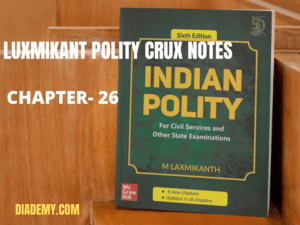
Supreme Court
| Introduction | · Indian Constitution has established an integrated (both Central & state law) judicial system (GOI Act, 1935 had a similar system)
· SC at the top: inaugurated 1950 · HLs below it · Hierarchy of subordinate courts; district courts and lower courts. · Articles 124-174, Part – V of the Constitution deal with SC. |
| Organisation of SC:- | · 31 judges at present (one chief justice and thirty other judges).
· Made by SC (no. of Judges) Amendment act 2008. · Originally there were 8. |
| Appointment of Judges | · Judges appointed by the President, in Consultation with other judges.
· Consultation with the CJI is mandatory for appointment of judges other than CJI. |
| Qualifications | Must be citizen of India, Judge for 5 Years (HC), advocate for 10 years (HC)/ Eminent Jurist. |
| Oath | Before President. |
| Tenure | Till attains the age of 65/Resign/Removed. |
| Removal | By President on recommendation of Parl. charge on provoke misbehaviour or incapacity.
Resolution at any house – · LS – 100 Mem. Support · RS – 50 Mem, Support. |
| Art 126 | Acting CJI – If vacancy/ temporarily absent/ Incapable |
| Art 127 | Adhoc Judge – when there is lack of quorum – CJI can appoint Judge of HC for temporary period. |
| Art 128 | Retired Judge – CJI can request any retired Judges |
| Art 130 | · Seat of SC – New Delhi
· If CJI wishes, any where in India. |
| Art 143 | · Procedure of Court – decide a bench consist at least 5 Judges
· For const cases or references |
| CJI | Master of Roster
Constitute bench + decide the hearing of petition |
| Independence of SC | Salary & Pension from CFI, Ban on Practice after retirement, free to appoint staff, decisions cannot be curtailed. |
| Jurisdiction | 1. Original Jurisdiction –
· Center vs. Union/state vs. state · Art 131 (direct hearing) · Dispute by a put citizen against state cannot be heared. · I.S. water dispute · Matter Referred to F.C. · Pre treaty agreement · Recovery of damage by a state against center/commerce nature b/w state.
2. Writ Jurisdiction – · SC guarantor and defender of fundamental rights of citizens. · Supreme Court is empowered to issue writs including Haebeas corpus, mandamus, prohibition, cover into, certiorari. · In this regard SC has original jurisdiction – aggrieved citizens can directly go to SC not necessarily by way of appeal. · When FR’s violated-directly approach SC for enforcement · HC can issue writs not only for enforcement of FR but also for other purposes-broader power 3. Appellate Jurisdiction – · Constitution Matter (Art 132) appeal against judgement of C< if H.C. satify satisfy that it is needed. · Civil Matters (ART 133) – In it involves sub-sequential question of law question need to be described. · Criminal Matters (134) – direct threat to body & property & further, 134(a) one has to take permission of HC. · Art (136) – Appeal by special leave (should be used cautiously as by SC). · Art 129 – Court of Record- Judgement proceeding and act are recorded for perpetual memory & testimony. · Punishment on the contempt of Court – 2,000 Rs. Or 6 month or both. · Contempt of court may be civil or criminal. · Civil – wilful disobedience · Criminal – obstacle creation intrept 4. Advisory Jurisdiction – · Art 143 – President can seek opinion from SC. · On the any question of law or fact. · On any dispute arising out pre const. treaty agreement, covenant, but advice – Non binding. · Power – Const of both Legislature of Central = state govt. · illegal, unconst. & invalid. · Other power – Art 137 – Review of its one judgement · Art 141 – decision binding on whole India. · Art 145 – Rule of Court Ø Ultimate interpreter of constitution Ø To with draw or transfer case. |
| Powers of the SC | 1. A court of record
– record all judicial proceedings and acts of SC. – Power to punish for contempt. 2. Power of judicial review. 3. Constitutional interpreter – Final and ultimate interpreter. 4. Other powers: a. Besides disputes regarding election of the President and Vice President. b. Enquires into conduct and behaviour of chairman of UPSC on reference of President. – Can remove for misconduct c. Power to review its own judgement or order – Kesavananda Bharati overruled Golak Nath case. d. Authorised to withdraw cases pending before High Court and dispose them by itself. e. Its law is binding on all other courts. f. Power of judicial superintendents and control over the courts and tribunals functioning in entire territory of country. g. SC’s jurisdiction and powers with respect to matters of the union list can be enlarged by Parliament. |
Get all essential Crux notes by clicking here https://diademy.com/product/staticcrux/